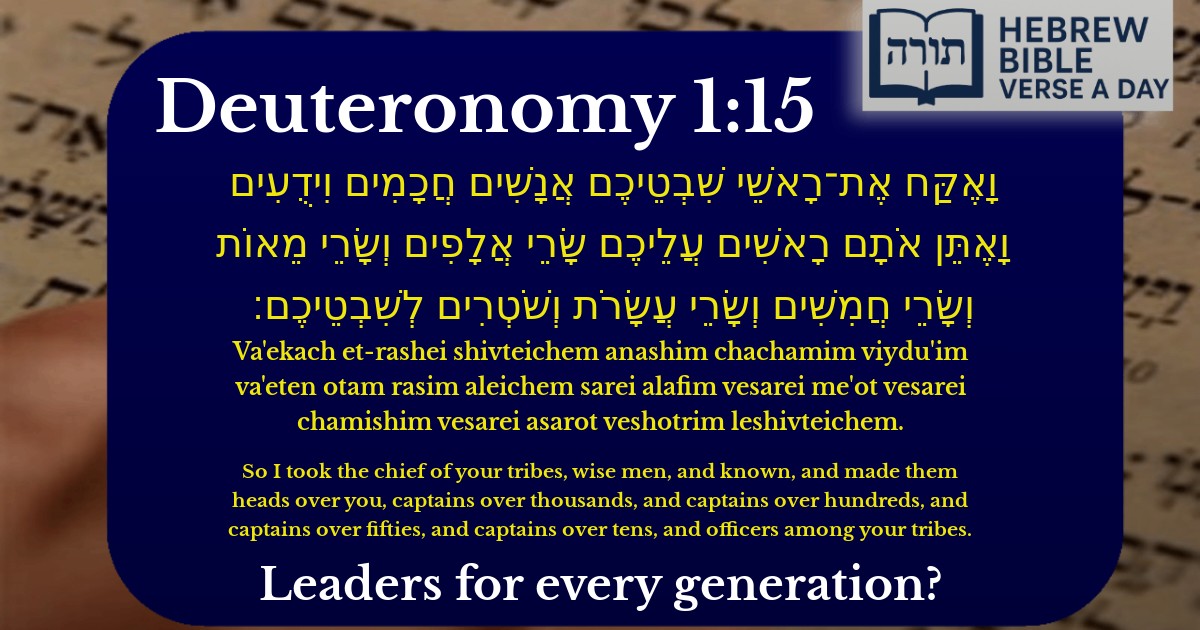Join Our Newsletter To Be Informed When New Videos Are Posted
Join the thousands of fellow Studends who rely on our videos to learn how to read the bible in Hebrew for free!
Hebrew Text
וָאֶקַּח אֶת־רָאשֵׁי שִׁבְטֵיכֶם אֲנָשִׁים חֲכָמִים וִידֻעִים וָאֶתֵּן אֹתָם רָאשִׁים עֲלֵיכֶם שָׂרֵי אֲלָפִים וְשָׂרֵי מֵאוֹת וְשָׂרֵי חֲמִשִּׁים וְשָׂרֵי עֲשָׂרֹת וְשֹׁטְרִים לְשִׁבְטֵיכֶם׃
English Translation
So I took the chief of your tribes, wise men, and known, and made them heads over you, captains over thousands, and captains over hundreds, and captains over fifties, and captains over tens, and officers among your tribes.
Transliteration
Va'ekach et-rashei shivteichem anashim chachamim viydu'im va'eten otam rasim aleichem sarei alafim vesarei me'ot vesarei chamishim vesarei asarot veshotrim leshivteichem.
Hebrew Leining Text
וָאֶקַּ֞ח אֶת־רָאשֵׁ֣י שִׁבְטֵיכֶ֗ם אֲנָשִׁ֤ים חֲכָמִים֙ וִֽידֻעִ֔ים וָאֶתֵּ֥ן אוֹתָ֛ם רָאשִׁ֖ים עֲלֵיכֶ֑ם שָׂרֵ֨י אֲלָפִ֜ים וְשָׂרֵ֣י מֵא֗וֹת וְשָׂרֵ֤י חֲמִשִּׁים֙ וְשָׂרֵ֣י עֲשָׂרֹ֔ת וְשֹׁטְרִ֖ים לְשִׁבְטֵיכֶֽם׃
וָאֶקַּ֞ח אֶת־רָאשֵׁ֣י שִׁבְטֵיכֶ֗ם אֲנָשִׁ֤ים חֲכָמִים֙ וִֽידֻעִ֔ים וָאֶתֵּ֥ן אוֹתָ֛ם רָאשִׁ֖ים עֲלֵיכֶ֑ם שָׂרֵ֨י אֲלָפִ֜ים וְשָׂרֵ֣י מֵא֗וֹת וְשָׂרֵ֤י חֲמִשִּׁים֙ וְשָׂרֵ֣י עֲשָׂרֹ֔ת וְשֹׁטְרִ֖ים לְשִׁבְטֵיכֶֽם׃
🎵 Listen to leining
Parasha Commentary
📚 Talmud Citations
This verse is quoted in the Talmud.
📖 Sanhedrin 16b
The verse is referenced in a discussion about the appointment of judges and leaders, illustrating the biblical precedent for establishing a hierarchical judicial system.


Context in Devarim (Deuteronomy)
The verse (Devarim 1:15) recounts Moshe Rabbeinu's establishment of a hierarchical judicial and administrative system for Bnei Yisrael, as initially described in Shemot (Exodus 18:21-26). This structure was implemented at Yitro's advice to alleviate Moshe's burden in judging the people.
Selection of Leaders
Rashi explains that the phrase "wise men, and known" refers to individuals who were:
The Sifrei adds that these leaders were chosen based on merit, not lineage, emphasizing the importance of wisdom and integrity in leadership.
Hierarchy of Authority
The Rambam (Hilchot Sanhedrin 1:3) derives from this verse the model for a tiered judicial system:
Lessons in Leadership
The Midrash Tanchuma (Shemot 27) highlights that Moshe did not appoint leaders arbitrarily but sought those who were:
This structure reflects the Torah's ideal of decentralized, merit-based leadership, ensuring justice and order for all of Klal Yisrael.